Baghdad Clashes Hurt 30 As Pro-Iran Groups Dispute Iraq Vote Results
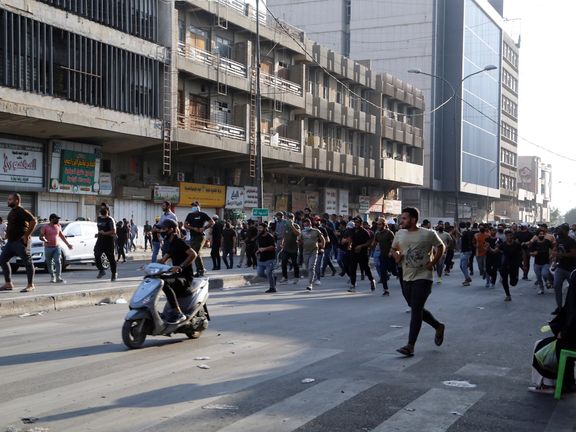
Clashes in Baghdad between Iraqi security forces and pro-Iran groups disputing the results of the October elections injured more than two dozen people Friday.

Clashes in Baghdad between Iraqi security forces and pro-Iran groups disputing the results of the October elections injured more than two dozen people Friday.
It was the first significant violent clash between government forces and parties, most of which have armed wings and are aligned with Iran, since those groups lost dozens of parliament seats after the Oct. 10 vote.
Police fired tear gas and live ammunition into the air as scores of the protesters threw stones and tried to advance towards Baghdad's fortified Green Zone, which houses government buildings and foreign embassies, security sources said.
More than 21 protesters were hurt mostly from smoke inhalation and another nine policeman injured from being pelted by stones, the hospital sources said.
The parties that made the biggest gains in Iraq's October election include that of populist Shi'ite Muslim cleric Moqtada al-Sadr, who publicly opposes Iranian interference in Iraqi politics and has called for all remaining Western troops to withdraw from the country.
The Iran-backed groups disputing the election result are also Shi'ite but follow an Iranian model of theocratic governance which the nationalist Sadr and many ordinary Iraqi Shi'ites reject.
The election result was seen as a rejection by voters of foreign influence, especially that of Iran.
Report by Reuters

The Chairman of Iran-China Chamber of Commerce has warned that Iran’s economy is at its “most dangerous historical point” in the past four decades.
Majid-Reza Hariri, a businessman, who has recently issued other warnings about Iran’s economy and what he called lack of oil sales, told the Iranian Labour News Agency (ILNA) on Friday that inflation is becoming a serious threat. He argued that if the inflation rate rises above the current 50-60 percent rate, it would become much harder to control it.
In the past few months, figures issued by the Statistical Center of Iran show more than 45 percent overall annual inflation, with food prices rising by almost 70 percent compared to last year.
Iran has been delaying nuclear talks with the West since June, when it suspended multi-lateral negotiations and is expanding its nuclear program. New talks are scheduled to start at the end of November, but few believe there will be a quick outcome.
In recent weeks, many other public figures, including senior clerics, have called on the government to take urgent action in containing the current economic crisis that according to some estimates has impoverished close to 50 percent of Iran’s population.
Hariri who in the past, as openly as possible, has called for resolving Iran’s disputes with the West, reiterated that rescuing the economy needs attention to improving foreign relations.
“A great part of Iran’s economy is dependent on oil exports, and it is not possible to cure this economic addiction quickly,” Hariri said, and added that removing the US sanctions should be a priority, but no matter what Iran is willing to do, the final decision, or the other side of the coin is America. Iran cannot be the sole decider in removing the sanctions. The United States must agree.
The other policy should be to shield the economy, as much as possible, from the impact of sanctions, Hariri said, and emphasized the importance of bilateral trade with many more countries than Iran’s current seven main trading partners.
Hariri, who usually speaks like a businessman rather than a government official, said that every decision the government makes it should consider the danger of uncontrolled inflation. “Any policy that could lead to higher inflation should be eliminated,” he said. If prices rise any further, the country can face hyper-inflation, which would be difficult to overcome.
He called on the government to use a wider range of economic experts for advice on inflation and not to narrow its thinking to one group of economists. Hariri mentioned the example of former finance minister Ali Tayebniya, who in the first four years of Hassan Rouhani’s presidency (2013-2017) was able to bring a 47-percent inflation rate down to 11-12 percent.
The head of the supreme labor committee said on Thursday that a basket of essential supplies for a family of 3 has reached 115 million rials. Although in today’s exchange rate that amounts to just $425, a typical worker in Iran receives much less than $200 a month.
Amid this crisis, president Raisi is seen as just issuing orders to his aides to fix a myriad of national and local economic and infrastructure problems. His critics, even among conservatives say the new government has been in power for three months and should start to put its act together.

A band of radical students, and followers of Ayatollah Khomeini, stormed the US Embassy in Tehran on November 4, 1979 and took Americans hostage for 444 days.
whiSome 42 years later, many wonder what became of those angry young men with shabby beards and young women, clad in long manteaus with headscarves hiding most of their faces.
One might think that at least some of them rose to positions of power. Yes, they did, but most of them fell out of favor and some even ended up in jail. No one knows exactly how many they were, but 42 years on, only a few of them are still engaged in politics, and most of them are shunned by the Iranian people and politicians alike.
In a November 4 tweet, former lawmaker and outspoken politician Ali Motahari, wrote that it was "an unnecessary move instigated with the provocations of leftist groups to serve the interests of the Embassy of the Soviet Union and the Tudeh Communist Party."
Many others reminded that the seizure of the US embassy in 1979 landed the country in trouble for four decades and imposed a long war with Iraq and back-breaking economic crisis on Iranians. But where are those who are to be blamed?

Their spokesperson Masoumeh Ebtekar was former President Hassan Rouhani's vice president for women and family affairs. She also served for some time as the vice president for the environment. Last week some lawmakers tabled a motion to take her to the top court for failing to protect the environment. Ebtekar is married to another hostage-taker Mohammad Hashemi Esfahani, an Intelligence Ministry operative who was also implicated in illicit oil deals. Ebtekar was known to the hostages as "sister Mary" and was one of the few students who spoke English.
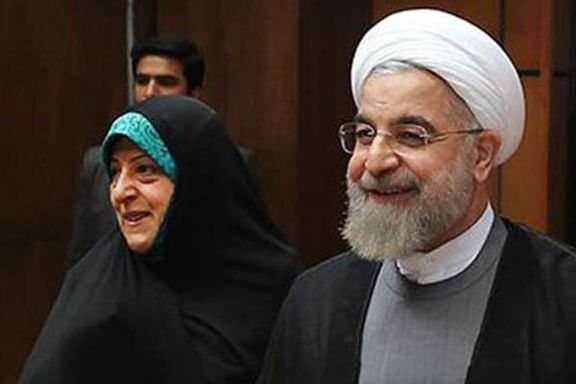
Ebrahim Asgharzadeh, who designed and masterminded the seizure in the first place is still around and is a well-known reformist figure shunned by the reform camp who know him as an insider at Khamenei's household. According to Mashreghnews website, which is close to the Iranian intelligence security forces, he led the hostage takers' ‘central council’.
Abbas Abdi, another member of the council soon left the group. He later became the editor of leftist newspaper Salam and is currently a high-profile reformist commentator. He is the only hostage-taker who met with one of the hostages years later and reportedly apologized for his behavior. Another leader, Mohammad Reza Khatami, is former President Mohammad Khatami's brother and is nowhere to be seen after he fell out with the establishment. Khatami served as deputy Majles Speaker in the 1990s.
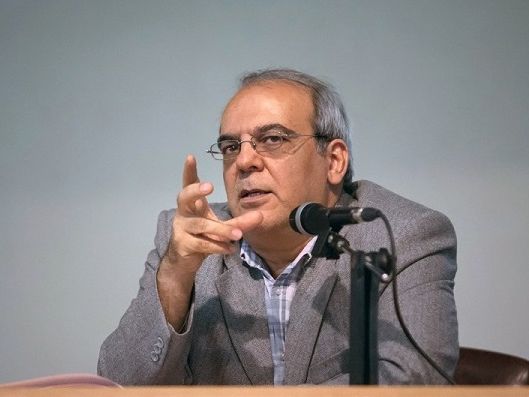
Mohsen Aminzadeh, also at the forefront, became a deputy foreign minister with links to the Intelligence Ministry. He was jailed following the disputed 2009 presidential election but is currently out of jail.
Hossein Kamali became Iran's Labor Minister and was close to former President Akbar Hashemi Rafsanjani.
The former students used to hold regular meetings at the US embassy building until 1985. They oversaw the translation and publication of embassy documents. In 1985, the Intelligence Ministry took over the remaining documents but no longer published their Persian translation. It was in that year when "The Students Following the Line of Imam Khomeini" decided to no longer exist as a group or political organization.
Some of their members, including Reza Seyfollahi, Aziz Jafari and Hossein Dehghan joined the armed forces. Seyfollahi was Iran's police chief for a few year and then disappeared from the political scene and joined the IRGC Intelligence Organization. Dehghan is currently Iran's Interior Minister and Jafari served as chief commander of IRGC for several years. Alireza Afshar served as the commander of Basij militia and Akbar Rafan was the first commander of the IRGC's air force.Several former students were killed in the course of the war with Iraq in the 1980s.
Habibollah Bitaraf was Khatami's Energy Minister and is currently under fire for the damage his policies did to Iran's environment. Ezzatollah Zarghami also joined the IRGC. In the 1990s he became deputy culture minister and then the head of the state television. He is currently Iran's cultural heritage and tourism minister.
One of the most interesting characters among the students who refused to take part in the seizure of the embassy was Mahmoud Ahmadinejad. According to Hashemi Esfahani, Ahmadinejad told others that the students should attack the Soviet embassy.
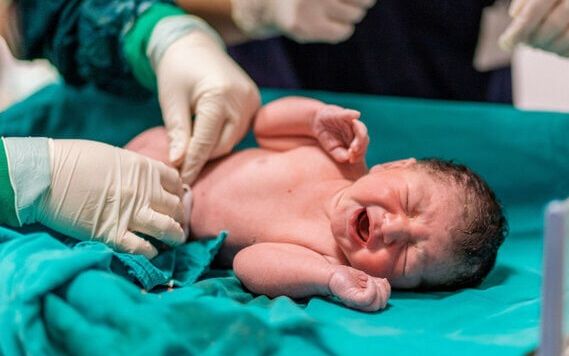
Births have declined more than expected in Iran this year, local media reported quoting figures from a government statistical organization.
The Iranian Student News Agency (ISNA) Friday reported that the Statistical Center of Iran figures show births declined by 11,000 from March 21-June 20. Total number of births in that period was 270,000.
This is the second year in a row that births have significantly declined in the country. In the same period last year there were 19,000 fewer births compared with 2019.
The specific reason for the accelerated decline in births has not been mentioned, although one obvious explanation is the current economic crisis and high rate of inflation Iran faces. Prices for food have skyrocketed by 66 percent this year compared with 2020.
Last month, an official said that Iran has now the lowest birth rate in the Middle East after experiencing the fastest decline in births during the past three decades.
Saleh Ghasemi, head of the Center for Strategic Research on Population told a local news agency that the current birth rate is 1.6 for each woman at the age of fertility. He added that in mid-1980s Iran had a 6.5 birth rate, one the highest in the world, but it has been declining since.
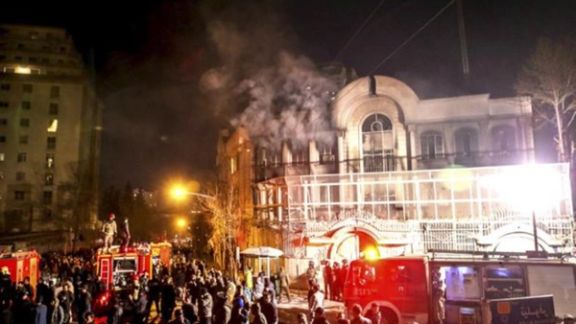
Saudi Arabia’s interest in improving relations with Iran is diminishing, according to a member of the Iranian parliament’s National Security and Foreign Policy Committee.
While Tehran and Riyadh – which have no formal diplomatic relations – back different sides in various regional conflicts, including Syria and Yemen, the two sides have held several rounds of exploratory talks in Baghdad.
"There were signals of Saudi's interest in reviving relations, but these signs have currently lost their luster a little,” parliamentarian Mahmoud Abbaszadeh-Meshkini told Shafaqna (Shia News Association) Friday. “Some signals have even turned into their opposite."
While Iran had "repeatedly announced that we seek improvement of relations,” Abbaszadeh-Meshkini said, the “groundwork” required before “official” talks had not been carried out. The parliamentarian also suggested that Iran's foreign policy was now more "focused on Asia and neighboring countries."
President Ebrahim Raisi (Raeesi) took office in August announcing a desire to improve Shia-Sunni relations, within Iran and across the region, as well as developing better ties with neighbors. Raisi’s goal might be to reduce Western pressure for discussing Iran’s regional behavior that has seriously alarmed Sunni states and Israel.
Saudi Arabia severed relations with Iran in January 2016 after a mob attacked its diplomatic missions in Tehran and Mashhad. The embassy in Tehran was set on fire and looted while Iranian security forces stood by.
Raisi’s foreign minister Hossein Amir-Abdollahian, who is speaks Arabic, held responsibility for Arab affairs as deputy foreign minister (2011-16) and was ambassador to Bahrain 2007-2010.
Last month hopes were widely expressed over restoring Saudi-Iran diplomatic relations, even of re-opening consulates in Mashhad and Jeddah as a goodwill gesture before the two sides addressed tricky issues like Yemen, where Saudi Arabia has been engaged for seven years in a costly and bloody war against Ansar Allah fighters with Iranian backing.
‘A very dangerous place’
But Saudi Foreign Minister Prince Faisal bin Farhan al-Saud said October 15 that Iran was accelerating its nuclear activities and thereby putting the region in “a very dangerous place.”
Iran’s foreign ministry said October 31 after four rounds of talks with Saudi Arabia that reopening of embassies would "take some time.” Prince Faisal noted that “solid progress had been made” that was “positive enough to allow for further discussion beyond, but nothing concrete as of yet.”
Conservative and hardline media in Iran this week condemned Saudi Arabia for expelling the Lebanese ambassador, banning Lebanon’s imports and demanding the resignation of Lebanon’s information minister George Kordahi after reports emerged of remarks he made before becoming a minister in which he described the Saudi intervention in Yemen as “aggression.”
Lebanon’s prime minister Najib Mikati, a Sunni, again called Thursday for Kordahi, a Christian, to step down to avoid further Saudi escalation as Riyadh rallied support for its move among other Sunni-led Gulf states, including Kuwait and the United Arab Emirates. Some analysts have interpreted the Saudi action as indirectly targeting the Allawi-led government in Syria, which is battling mainly Sunni rebels backed by Saudi Arabia, or even targeting Iran, whose Shia ally Hezbollah is supporting Kordahi.
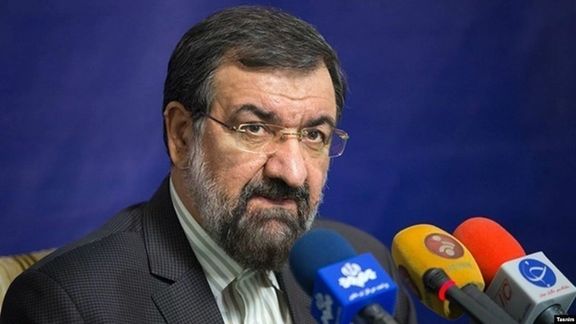
President Ebrahim Raisi’s top economic official says Iran has been “smuggling oil and bringing the dollars back secretly” because of “illegal” US sanctions.
Mohsen Rezaei, First Vice President for economic affairs, told a gathering during a provincial visit that Iran accepted all condition during nuclear talks with world powers and agreed to the 2015 nuclear deal (JCPOA), but “The next US government violated it and put us under economic siege.”
After former president Donald Trump withdrew from the JCPOA in May 2018 and imposed sanctions, Iran’s oil exports dramatically fell and then increased somewhat a year ago coinciding with the election of Joe Biden as President.
Iran exports most of what it sells now to China, although official Chinese data do not reflect any Iranian oil imports. No one knows how much oil Iran smuggles, but estimates put the number at around $10 for the past 12 months.
Although Rezaei says Iran repatriates the proceeds in cash dollars, the oil is sold at a discount and through middlemen who make a lot profit.